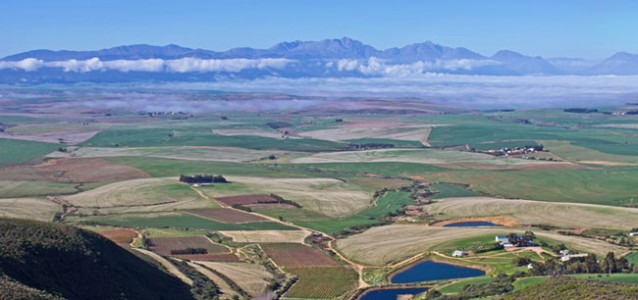It’s not about the climate. There I’ve said it. Whenever I speak to or read about farmers, it’s very clear – they know plenty about climate and they know plenty about weather…and it can be summed up by “it’s changeable”. Of course, they can’t accurately predict drought or wet years, but they know they will come. Perhaps they have seen the climate change, perhaps they haven’t …and yes it will change, but how and when? And so they respond by doing one of 2 things: modernise or diversify (or less often, a bit of both).
The modernisers inevitably seek their salvation in the profit/loss equation where mechanisation, consolidated and precision farming ensure the lowest costs and the highest return. Focused monoculture and advanced technologies are followed and if transferred and implemented successfully in rural Africa will herald the acceleration of economic growth with its attendant benefits of increased food production and security.
The losses incurred in a drought year are balanced by surpluses in a good year. The land is used as a willing tool to make money, with food as a by-product. What about the quality, nutrition and variety of the crop? What of the moral imperative of equitable land use? What about the environmental consequences? These so-called negative externalities of the process are regarded as inevitable and part of the business. Seldom do farmers or farming corporations of this following see the holistic integration of social, environmental and economic factors as important.
On the other hand, the diversificationists are of a different ilk. Where profit is a necessary requirement over the short term, the longer-term good of the system, biological, economic and social, is critical. So these farmers are concerned with well-being; they consider the soil, the crop mix, the people working for them and they diversify to enhance the benefits and diminish the harm. And they grow food. That they become more resilient to climate variability is also a welcome addition. It may cost them a bit more money and effort, initially, and maybe longer, but they have the satisfaction of being less dependent on the weather, and a more interesting approach.
Who should we support? The modernisers may be fully justified to run their business as they see fit, to contribute and benefit from the economics of commercial agriculture, within the laws of the land. They work as hard, risk as much and ostensibly contribute equally to the food security and demand of modern South Africa. The diversificationists are equally defensible in their actions. From an ecological and social point of view, one would be tempted to say they occupy the higher moral ground, but perhaps they earn less money and contribute a little less to the economy and the country’s food basket?
Of course, this wouldn’t be an opinion piece without my opinion, and thinly veiled as it is, I’m sure you can see what I’m suggesting. Would not a win-win situation in our country entail engaging such diversificationists and encouraging their proliferation? Could we somehow, with the same vigour as our ethical eating and cruelty-free campaigns, insist on biodiverse farming? I recently bought some sourdough bread in Riviersonderend that is made from 100% local higher quality wheat, farmed by way of conservation agriculture. This wheat is less profitable than the low-quality stuff that is freely imported and mixed with local brands to satisfy the demand for cheap bread. Yes, it cost R30 for a loaf, but considering that, on the whole, we should probably be eating less bread and better bread, would support for the farmer who goes that extra mile and eschews maximum short-term profit for longer-term sustainability not be a worthwhile aim?
All of us “are what we eat” in a literal sense, and we read labels, try to source ethical products and of course eat as healthily as our budget, conscience and tastes allow. But, mostly, our food still comes from the supermarket at a price we can afford, and we seldom know or find out much more about its origin.
Eat meat, don’t eat meat; eat bread don’t eat bread…it’s your choice, but as knowledge leads conscience, and education breeds responsibility, let’s think about it in the larger context of the greater good.

Chris Jack
I think the missing element in this discussion is that a huge proportion of the food “demand” in South Africa (and Africa generally?) comes from those living close to poverty lines or at least without the financial freedom to choose the “ethical” option. “we should probably be eating less bread and better bread” is fine for those of us living with the luxury of being able to make these choices. Choosing to buy a R30 loaf of bread over a R5 loaf of bread just isn’t in the decision space of the majority… This extends to a lot of discussions of “lifestyle ethics” be it solar power, water harvesting, grey water systems, etc.. they are options largely only available to the wealthy either because they cost more ongoing, or the initial capital outlay is out of reach.
I don’t have answers as such, thoughts yes… maybe in a blog post of my own sometime.
Bruce
As someone once said, “the truth probably lies somewhere in between”. Swinging to the extremes of either-or is often an activists position, but pragmatism often (always) entails a measure of compromise, of finding a middle ground that can be walked for awhile as there is a slow lean by collective society toward one or other position becoming prevalent. Thus positioning the debate as either-or possibly does not do full justice to the diversity of relativistic world views and values. Herein lies, I argue, the true dilemma; How to determine measures of value in our contemporary world of subjective relativism (and by what authority?)